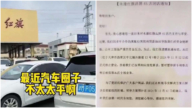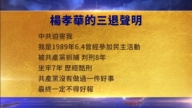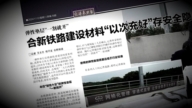【新唐人2011年6月7日讯】大陆上被称为“二币”(第二人民币)的“消费购物卡”,由于被普遍认为是特权部门贪污贿赂的管道之一,中共国务院近期转发了人民银行等七部委《关于规范商业预付卡管理的意见》,希望扼止歪风。不过有媒体质疑:这种不动脑筋就能破解的“反腐政策”,不过是一种“懒人政策”。
对于国务院等七部委整治购物卡歪风的所谓“新政策”,这个月初《南方周末》报导说,破解“新政策”的方式“再简单不过”。由于整治购物卡的主要特点集中在“实名制”、“非现金”和“限额”等三个新措施。
比如“实名制”规定:一次性购买1万元以上的“不记名”购物卡,发卡人必须实名登记,破解之道就是一次只买9999元。
而“非现金”的要求是,一次购卡达5000元以上,或个人一次购卡达5万元以上,要通过银行转账,那就一次买4999元、个人一次买49999元,一样可以用现金购买。
“限额”的措施要求:不记名购物卡的面值不超过1000元,记名的不超过5000元,那么,破解方式麻烦点,不过,多买几张卡就是了。
《工人日报》的记者实地采访也发现,像金融街这种购物卡交易盛行的地方,街上的收卡黄牛人数其实没有减少,只是不像以前那么高调,可能躲到不显眼的地方,或伪装成为消费者在商场内闲逛。
有“黄牛”私下说:新制度规定,单位一次性购卡5000元及以上,或个人一次性购卡5万元以上,只能转账或凭支票,因此能查到是哪家公司办的。不过只要给“黄牛”足够的手续费,就有人可以代买购物卡,这样银行转账记录就查不到真正买卡的是谁?要再通过发票查到实际购买者的可能性根本不大。
而消费者购物时,收银小姐往往睁一只眼,闭一只眼,不去理会购物卡是不是“实名”的问题。“黄牛”们仍然可以以购物卡代替消费者付费,消费者再以现金形式打折返还给“黄牛”,一位女士跟媒体说:商场不会因为我刷的不是我的名字的购物卡,就不让我消费吧?
《工人日报》记者估计,如果像黄牛说的,每月办卡业务量有20单的话,每个购物卡金额有10万元,手续费最低5%,也就是5000元的话,每个月光是手续费的收入就超过10万元。
《南方周末》还指出,这次出台的购物卡新政,看起来像是七部委联合发文,由国务院转发,演出阵容豪华,不过经验告诉大家,越是“齐抓共管”,最后越是“九龙治水”,谁也不想管。而且所谓的“管理意见”不是法律,转发意见的国办只是国务院内设的办事机构,没有执法权。最后可能只剩下一纸空文。卖购物卡的商家和买购物卡的单位根本不怕,商家甚至连“下有对策”都懒得想。
现在中国要整治的恐怕不只一张小小的购物卡。像是各地盛行的:过节不收礼,收礼只收“脑白金”—健康品礼盒!天价茅台酒!镶钻戒月饼!民众都知道这些就是专门用来“送礼”的。
《南方周末》的记者感慨,像购物卡这种国外用来便利刺激消费的工具,为什么一到中国就变了味了?值得民众深思。
新唐人记者曾耀贤、柏妮综合报导。
Signatured Shopping Cards against Bribery
Shopping cards, as RMB’s substitute,
are widely used for bribery by the privileged in China.
CCP (Chinese Communist Party) State Council
reprinted 7 ministries’ Suggestions on Commercial
Card Regulation, in the hope to end corruption.
The new policy’s effectiveness is being questioned.
Local media Southern Weekend reported that
it’s so easy to get around this new policy.
The policy focuses on three new features:
Real-name system, Non-cash and Limits.
Card holder registration is compulsory for
all cards worth over 10,000 RMB.
The way is to purchase cards worth RMB 9,999.
For purchases of cards of over RMB 5,000 and
individual one-time purchases of over RMB 50,000,
payments must be made through bank transfers.
People can simply make purchases of RMB 4,999.
As per Limits requirement, non-holder-registered
shopping cards’ value cannot exceed RMB 1,000.
Registered cards’ value cannot exceed RMB 5,000.
However, people can simply purchase more cards.
Reporters from Worker Daily have found that
at places such as the financial districts, there were
still many shopping card scalpers with a low profile.
Many disguised themselves as shoppers.
Some scalpers tipped off reporters that
although the shoppers’ identities are traceable
with purchases with checks or bank transfers,
scalpers can help buy shopping cards for a fee.
In this way, it is difficult to trace the actual buyers.
Also, the cashiers normally turn a blind eye on
the issue of shopping cards registration.
Scalpers can still make payments for consumers,
who then pay the scalpers with cash.
A lady said, stores wouldn’t forbid her to shop,
just because the card she has bears a different name.
Worker Daily estimated, according to the scalpers,
if there are 20 card transactions in a month,
with a value of RMB 100,000 each and
a commission of minimum 5% of the card value,
the commission fees alone exceed RMB 100,000.
Southern Weekend also pointed out that
although this new policy is issued by 7 ministries
and reprinted by the CCP’s State Council,
in practice, nobody will take real charge.
The so-called Suggestions are not laws,
and its reprinting authorities within the State Council
have no law enforcement power.
The buyers and sellers of the shopping cards
are not concerned about the new policy at all.
There are more issues in China than shopping cards.
The prevalent melatonin products, health gift boxes,
luxury Maotai Spirit and diamond ring moon cakes
are widely known to be used for bribery.
Southern Weekend reporters questioned,
cards are used elsewhere to stimulate consumption,
why did their purposes get changed in China?
NTD reporters Zeng Yaoxian and Bo Ni





























